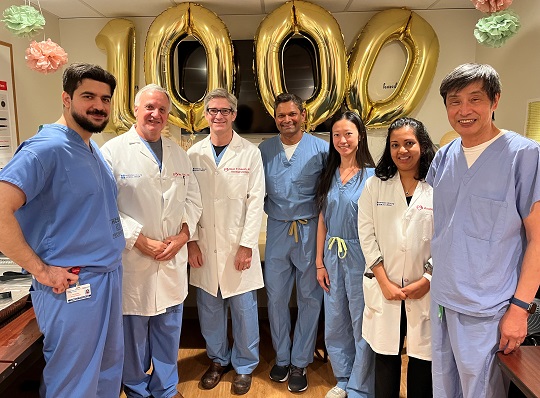
Cardiologists at Cooperman Barnabas Medical Center (CBMC) recently completed their 1000th WATCHMAN FLX™ procedure for patients with atrial fibrillation (AFib), making it the largest program in New Jersey and New York and the first to hit this milestone. CBMC has been offering this treatment option since 2017.
For those who have AFib not caused by a heart valve problem (also known as nonvalvular AFib), the WATCHMAN FLX™ offers a safe and convenient alternative to blood thinners.
“Hitting this milestone is an incredible accomplishment for our cardiology team,” says David P. Dobesh, MD, an RWJBarnabas Medical Group cardiac electrophysiologist. “We are very excited about implanting our 1,000 Watchman here at Cooperman Barnabas Medical Center because it is a testament to the high level of expertise offered by our imaging and implanting cardiologists. It also demonstrates the outstanding outcomes and improved quality of life they’ve been able to achieve for patients with AFib.”
September is Atrial Fibrillation Awareness Month, which serves as a timely reminder of the increased risk of stroke among people living with AFib. Approximately 7 million Americans have AFib, a condition that affects the heart’s ability to pump blood normally, causing blood to pool in the left atrial appendage (LAA), a sac-like pocket located in the wall of the heart’s top left chamber, where a blood clot may form. When a blood clot in the LAA travels to another part of the body such as the brain, it can cut off the blood supply, causing a stroke.
“The average person with AFib is about five times more likely to suffer a stroke than someone with a regular heartbeat,” says Dr. Dobesh.
The WATCHMAN FLX™, which fits into the opening of the LAA, ranges in size from a quarter to a half-dollar. The parachute-shaped device that is composed of a self-expanding, nickel-titanium frame with a polyester fabric cover. It is implanted through the vein and is designed to permanently close off the LAA to keep blood clots from entering the bloodstream. “The Watchman has been a game changer in how we treat AFib,” says Dr. Dobesh. “It reduces the risk of stroke without the increased risk of bleeding from blood thinners.”
During the procedure, which takes about an hour and is usually performed under general anesthesia, a catheter is threaded through a blood vessel near the groin and up through the heart to the LAA. “The recovery is very quick, and most patients go home the same day and will be back to normal that week,” says Dr. Dobesh.
After the procedure, patients are required to remain on blood thinners for 45 days, during which time the heart will grow its own new tissue over the Watchman to create a permanent seal. A follow-up echocardiogram or CT scan will be performed to confirm that the LAA is sealed properly. The device is permanent and never needs to be replaced.
To find out more about Cardiac Services available at Cooperman Barnabas Medical Center, please call 973.322.5244 or visit www.rwjbh.org/heart.